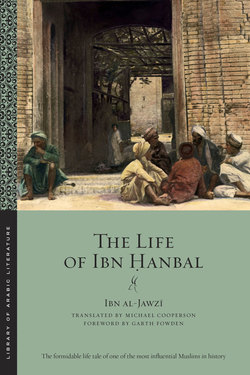Читать книгу The Life of Ibn Ḥanbal - Ibn al-Jawzi - Страница 9
На сайте Литреса книга снята с продажи.
ОглавлениеFOREWORD
GARTH FOWDEN
During the first half of the ninth century, most of the Abbasid Caliphate’s subjects were Christians, Jews, Zoroastrians or even pagans. The ruling minority of Muslims faced, at almost every turn, the threat—or allure—of other ways of life and thought, deeply rooted in landscape, history and custom. No wonder they often felt embattled, or succumbed to temptation: it might come in the form of an invitation to a neighbor’s house, a casual romantic or sexual encounter, or the need to bury a non-Muslim parent. There was, in any event, a need for detailed instruction about everyday deportment. Guidance might be sought in the Qurʾan, but much in it was ambiguous or left unsaid. Traditions about the Prophet’s sayings and doings (hadiths) proliferated to fill the gap. The eminent legal thinker, al-Shāfiʿī (d. 204 H/820AD), strongly advocated the authority of hadiths in his epoch-making Epistle on Legal Theory (recently translated for the Library of Arabic Literature).
In the next generation, Aḥmad ibn Ḥanbal (d. 241H/855AD) made a reputation that has never faded, not just as an indefatigable collector of hadiths, but also as one of the greatest exemplars, after the Prophet himself, of the conduct the hadiths prescribed. The numerous responses Ibn Ḥanbal offered to enquiries from pious fellow Muslims present a lively picture of daily life in ninth-century Baghdad. In the eyes of ordinary people, however, Ibn Ḥanbal’s reputation rested chiefly on his unflinching endurance of a severe flogging at the command of the Caliph al-Maʾmūn (r. 198–218H/813–833AD). This was Ibn Ḥanbal’s recompense for insisting on the doctrine of the uncreatedness of the Qurʾan as God’s living word, for which al-Maʾmūn sought to substitute a view of scripture that left room for human interpretation based on reason. Al-Maʾmūn had his own distinctive ideas about interpreting scripture and in general about the sources of authority in Islam; but Ibn Ḥanbal’s resistance contributed decisively to the triumph of scholarly research over caliphal will in determining Muslim doctrine. Increasingly, an attachment to Qurʾanic scholarship was construed as excluding resort to ratiocination or speculation—these were the sins of the philosophers. Whereas al-Maʾmūn was closely associated with the translation of Greek philosophy into Arabic, Ibn Ḥanbal would have no truck with such writings, which were neither Arabic nor Muslim.
The Ḥanbalī school—named for Ibn Ḥanbal—was already flourɍishing by the tenth century, despite competition from other schools of legal thought. It continued to renew itself during the centuries that followed, first in Baghdad, then in Damascus. It prospered less after the conquest of the Arab lands in the early sixteenth century by the Ottomans, who favored the Ḥanafī school of legal thought. By one of those symmetries of history that Ibn Ḥanbal himself would perhaps have appreciated, it was a little outside the Ottoman domains, in eighteenth-century Central Arabia, that his school experienced its most memorable revival, just as the Prophet himself had arisen in the relative obscurity of the seventh-century Hijaz, to address and resolve the political and theological tensions that were tormenting the neighboring empires of Sasanid Iran and—especially—East Rome (Byzantium).
Given the global reach of the Saudi version of Islam today, and its debt to Ibn Ḥanbal, much of the significance of Michael Cooperson’s painstaking work on Ibn al-Jawzī’s Life of Ibn Ḥanbal is in danger of being lost on those who fail to see it in the context, not just of Abbasid Baghdad, but also of Wahhabism in the Arabian Peninsula. In his erudite and elegantly written guide to the history of Hanbalism, the monumental Commanding Right and Forbidding Wrong in Islamic Thought (2001), Michael Cook draws a striking contrast. On the one hand there is a quietist Ibn Ḥanbal who reproved wrongdoing but discouraged aggression towards its perpetrators, keeping a firm distance from the repressive apparatus of the state and eschewing political activism. On the other hand there is the Ḥanbalī scholar Muḥammad ibn ʿAbd al-Wahhāb (d. 1206H/1792AD), who in alliance with the Emir Muḥammad ibn Saʿūd (d. 1179H/1765AD) launched an all-out assault on what he saw as “polytheistic” practices in the scattered oases of Central Arabia. As Cook puts it, “Hanbalism was now cast in the unfamiliar role of a doctrine of state-formation in a near-stateless tribal society.” But the doctrine, as distinct from its possible political applications, remained the same.
As for the duty incumbent on every Muslim, and exemplified by Ibn Ḥanbal, of “commanding right and forbidding wrong,” the Saudi state progressively institutionalized it by having local emirs conduct active investigations (Ibn Ḥanbal had preferred to avert his gaze where possible, and reprove only when he had no choice). Cook argues that as the Saudis ran out of opportunities for further expansion and jihad against the infidel, they turned their righteous aggression on the enemy within. But when in 1924–25 they finally conquered the Hijaz and the Holy Places, “the juxtaposition of Wahhābī Puritanism and the laxer attitudes of the wider Muslim world was a prescription for trouble” (182). Hence the setting up in 1926 of a “Committee for Commanding Right and Forbidding Wrong,” populated by scholars and notables, to control the thuggish behavior of Bedouin enforcers towards the lucrative foreign pilgrims. Prayer-discipline, alcohol, smoking and segregation of women were major preoccupations. Similar committees were established throughout the kingdom, and their influence has endured. Cook concludes by reflecting on the effective strangulation, by bureaucratization, of what began as “a strongly apolitical and individual doctrine” (192).
In the pages that follow, readers will encounter for themselves the most convincing exemplar of that tradition, who has done as much as any other human, after the Prophet and his Companions, to shape the central characteristics of Sunni Islam as we see it lived today.
Garth Fowden
Sultan Qaboos Professor of Abrahamic Faiths,University of Cambridge
